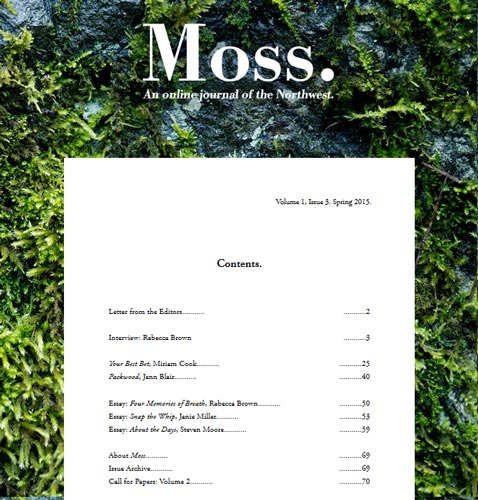Moss – Summer 2015
The triannual, online Moss is “dedicated to bringing Northwest literature to new audiences and exposing the emerging voices of the region to discerning readers, critics, and publishers.” What better way to do this than by opening the Spring 2015 issue with an interview with Rebecca Brown, a Seattle-based writer? The triannual, online Moss is “dedicated to bringing Northwest literature to new audiences and exposing the emerging voices of the region to discerning readers, critics, and publishers.” What better way to do this than by opening the Spring 2015 issue with an interview with Rebecca Brown, a Seattle-based writer?
Brown’s books include American Romances; The Terrible Girls; The Haunted House; Excerpts From A Family Medical Dictionary (Washington State Book Award); and Gifts of the Body (Lambda Literary Award). Interviewed by Editor Alex Davis-Lawrence, Brown discusses making the Northwest her home, being a lesbian writer in the 80s and 90s, teaching, writing, religion, and so much more. Normally not a huge fan of interviews, Davis-Lawrence and Brown managed to keep me interested throughout. Bits of humor help spice the conversation up, eliciting a couple laughs as I read, like this passage speaking about being a solitary vs. social writer:
But I also think that sometimes people developing independently can end up doing something really different. I think, retrospectively, I wouldn’t have had my history any other way. Plus, you don’t want your whole life to be spent running around being a writer/social butterfly. You can’t be out all the time. When are you home being miserable and lonely and writing? You need them both.
My only qualm was that the interview seemed to fizzle out, ending with: “It’s just insane. I don’t know how young artists survive here,” instead of a slightly more positive note to the young artists who may be venturing westward, just as Brown once did.
After reading the interview, it was nice finding Brown’s writing later in the issue with her essay “Four Memories of Breath.” Made up of four vignettes, Brown explores breathing, from a baby’s tiny breaths in a crib to the last breaths of Donna, a family member or friend, and finally ending with a beautiful look at the way the world itself breathes around us.
In “Snap the Whip,” one of two other essays, Janie Miller writes of visiting her parents, of memories from childhood when her mother’s schizophrenia began to surface. Her skill with bigger details compares her family to Winslow Homer’s painting Snap the Whip:
I had always wanted to feel the tension of the painting in person; the way two boys stand in the back, holding the line; another boy in a startlingly white shirt centers the break; a group of boys swing the momentum; two boys tumble into the ground. A human whip where each individual movement has a purpose in the motion. And when I saw the painting I cried because there we all were. My father holding the line, my brother centering the break, me running ahead, my mother taking the fall. We are all there, and there are flowers and stones all around the frame.
While her skill with finer details compares the clicking of airplane seatbelts unbuckling to the sound of dominoes falling. Miller is a master of her craft, creating a piece that is poignant and raw.
The final essay, “About the Days” by Steven Moore, collages memories of being in the military and stationed in Afghanistan with reported mission statements which “always had required parts, just like a story: who, what, where, when, and why.” At this point, I’m sure most, if not all, readers have had military friends or family who have spent time overseas in Iraq, Iran, or Afghanistan. I personally was reminded of the stories my brother brought back from Iraq, like catching huge camel spiders for entertainment: “The enormous spider that was caught so it could be made to fight was released because an opponent could not be found.” Moore shares a gritty and honest look into life for deployed soldiers, maybe venturing to offer even more than our own friends and family have—the nightmare-inducing memories they bring back home but keep bottled up.
Both pieces of fiction this issue are great reads: “Your Best Bet” by Miriam Cook and “Packwood” by Jenn Blair. In “Your Best Bet,” the narrator comes into possession of her ex-husband’s pet tiger after George, the ex, passes away. Caring for the animal while living in her old home without George there, she recounts their relationship, their marriage at a young age as protection from her stepfather, and their separation when she later sought freedom. But there is no freedom for the tiger, a truth the narrator soon has to face when the tiger’s health takes a turn. The story is both entertaining for the oddity of the situation and touching, and I was on the edge of my seat as the tiger’s fate revealed itself.
In “Packwood,” Blair brings us to Yakima, Washington, her narrator possibly the only one in the city “who gets paid for taking the paper from the front step and reading the obituaries.” Running from the emptiness of her home for the night, the narrator whisks readers away on a small tour of the area, fully embodying Moss’s mission statement to share Northwest writing.
But one doesn’t have to be from the Northwest to fully appreciate the works inside this issue of Moss. A quiet, calm experience, this issue offers a welcome escape with each of the pieces presented.
[www.mosslit.com]






